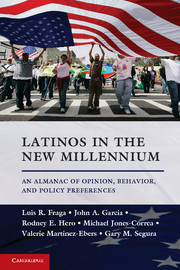Book contents
- Frontmatter
- Contents
- Acknowledgments
- 1 Latinos in the New Millennium
- 2 A Demographic Profile of Latinos in the United States
- 3 Core Values
- 4 Latino Identities
- 5 Latino Transnationalism
- 6 Intergroup Relations
- 7 Civic Engagement
- 8 Latino Media and Technology Usage
- 9 Voter Registration, Turnout, and Choice
- 10 Evolving Patterns and Preferences in Latino Partisanship
- 11 Latinos and Gender Role Attitudes
- 12 Latino Issues and Policy Preferences
- 13 Hope and Reality in Latino Educational Attainment
- 14 Latinos and the Future of American Politics
- Index
- References
1 - Latinos in the New Millennium
Knowledge and Misperceptions
Published online by Cambridge University Press: 05 June 2012
- Frontmatter
- Contents
- Acknowledgments
- 1 Latinos in the New Millennium
- 2 A Demographic Profile of Latinos in the United States
- 3 Core Values
- 4 Latino Identities
- 5 Latino Transnationalism
- 6 Intergroup Relations
- 7 Civic Engagement
- 8 Latino Media and Technology Usage
- 9 Voter Registration, Turnout, and Choice
- 10 Evolving Patterns and Preferences in Latino Partisanship
- 11 Latinos and Gender Role Attitudes
- 12 Latino Issues and Policy Preferences
- 13 Hope and Reality in Latino Educational Attainment
- 14 Latinos and the Future of American Politics
- Index
- References
Summary
Purpose of the Book
Themes and imagery about Latinos in the United States often focus on the rapid and substantial growth of this population and projections about the continuing impact of those demographic changes into the future. Portrayals in policy debates and the media have depicted the central facets of this fast-growing community – where they come from, how they are transforming traditional centers of migration with new destinations, the trials and tribulations of making it in America, and how the greater American society and its institutions respond to Latinos – imperfectly at best. The faces, stories, and life experiences of Latinos tend to be portrayed largely through sketchily drawn caricatures of working-class, immigrant-based communities trying to find an economic foothold to achieve the American dream; yet also holding steadfastly to traditions, cultural beliefs, and practices that sometimes fit uncomfortably with contemporary America.
But how accurate are these sketchy images, individually and collectively? What is the reality of the Latino experience in the United States? How can we better understand the views and perspectives of Hispanics in American society regarding such issues as education, politics, and public policy? What hard evidence can be brought to bear on this large, growing, and complex population that would help us situate the group in the American polity?
- Type
- Chapter
- Information
- Latinos in the New MillenniumAn Almanac of Opinion, Behavior, and Policy Preferences, pp. 1 - 28Publisher: Cambridge University PressPrint publication year: 2011



